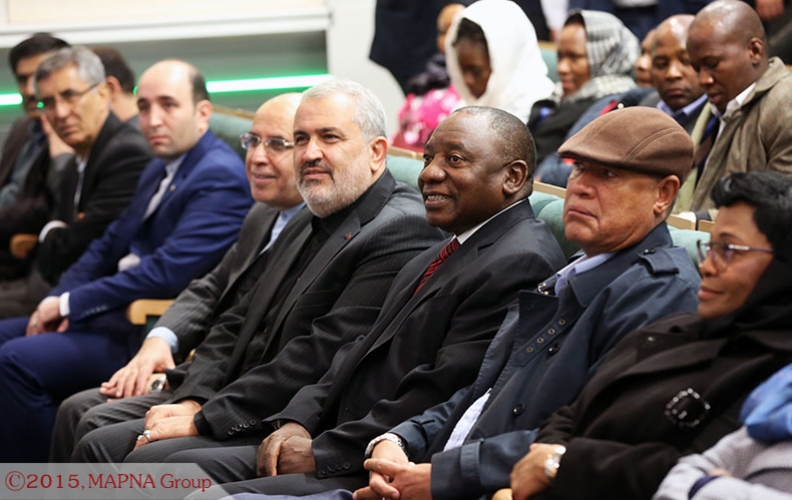Tehran was gracefully rainy on Monday November 9, 2015 as we were heading towards MAPNA factories in Karaj, west of Tehran, to receive South African Deputy President Cyril Raphamosa. Construction cranes, like a flock of migrant birds, decorated the skyline in westernmost parts of Tehran. Urban aesthetics aside, it could be a good sign: that Iranian economy is resilient, despite all the hardships inflicted by the sanctions.
TUGA (Turbine Engineering & Manufacturing Company) was in a hectic mood when we arrived, and final arrangements were made for the reception ceremony. A small group of the South African delegation had arrived earlier and were having small talk with their Iranian hosts before a general presentation of MAPNA Group was to be delivered.
Deputy President Raphamosa broke the ice early in the presentation. “So I wouldn’t get a job in MAPNA” he quipped, when Majid Bahmani, CEO of TUGA told the audience how a minimum of associate degree is required to join the company. MAPNA’s impressively broad range of activities in power, oil and gas, and locomotive was presented to the delegation. “We believe that MAPNA is a total solution now” said Mr. Bahmani. “More than a total solution,” replied DP Raphamosa.
The delegation went on a tour around MAPNA factories afterwards. “Our factory worked three shifts per day during the recent years” Mr. Bahmani told the Deputy President while presenting the turbine assembly line in TUGA. Technicians were busy working on the components. “All of them have passed technical training, some of them in Germany,” said Mr. Bahmani. “For some, we have invested as much as 10 PhD students.”
The delegation posed for a group photo and moved towards PARTO (Blade Engineering & Manufacturing Company). “No one sold turbine blades to us, we had to manufacture ourselves,” says Mr. Bahmani. “And now we are selling back to them.” The success story seemed to have impressed the delegation. And lunch time arrived after a short tour in PARS (Generator Engineering & Manufacturing Company).
The South African delegation returned to the Azadi Hotel after the lunch. The hotel is bustling with foreign visitors these days: tourists, investors, and governmental officials who seem to have ‘rediscovered’ Iran. It is a pleasant sight to the eye: the Persian cat is hosting back to back economic and industrial delegations these days; the French, the German, and even the British. South Africans’ visit sends more positive signals however, that diversification and South-South cooperation are now on the agenda.








